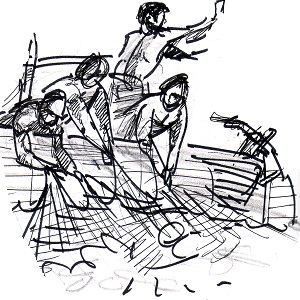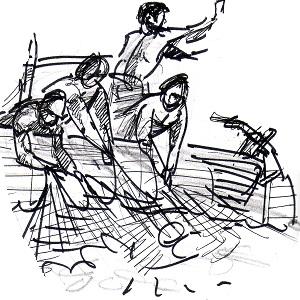

“Master, we have worked hard all night and have caught nothing” (Luke 5:5).
With the story of the amazing catch of fish, we see what a masterful storyteller Luke is, artfully selecting details and dramatic action to capture a key moment in the memory of the early church. The lake and the fishing boats are an important backdrop for the call and training of the first disciples. The Gospel itself is an invitation to leave behind the predictability and security of dry land to engage the mysteries of the deep.
The many lake crossings recorded in the Gospels provided important metaphors about baptismal initiation and formation, surviving storms, keeping faith when God seemed absent or asleep, always trusting in the presence of the risen Jesus, even to the point of learning how to walk on water if necessary. Luke’s faith community must have drawn on these images as new members were formed in the church. How encouraging it must have been for the church to hear Peter say, “Master, we have worked hard all night and have caught nothing,” knowing in times of discouragement that fearless faith always yielded abundance.
Today’s passage is part of the call of Peter, whose boat becomes Jesus’s pulpit, then the scene of a spectacular catch of fish that drives Peter to his knees with the realization that, despite his unworthiness, he is being drawn into an adventure he is not prepared for but cannot turn away from. Who is this man who can heal the sick, drive out demons, summon fish that have eluded his nets all night to fill his boat to the sinking point?
The tradition of Peter the fisherman was rich in metaphors for the church’s mission to go out to the whole world to catch people for Christ. When the church was dulled by routine and preoccupation with conformity and self-preservation, it was time to “put out into deep water and lower your nets for a catch.” Renewal came from expansion, going to the margins.
Peter was a model for continual reform and conversion. If he could fail so often yet emerge as leader, so must the church grow and change. Despite our weakness and even sinfulness, disciples are sent to attract others. Pope Francis says this, not argument or instilling fear, is how evangelization works. People must see our joy and goodness, and they will want to be with us.
The church is not an institution as much as it is an expanding network of relationships, starting with our relationship with God, then by our sharing the love that flows from the Source in every personal encounter, accompaniment, dialogue and friendship. What Luke’s faith community learned and lived, we are called to trust in and apply to our own contemporary needs.
Advertisement




